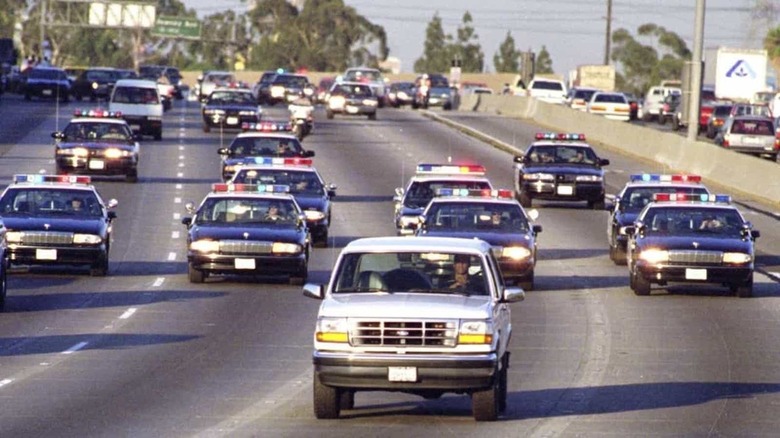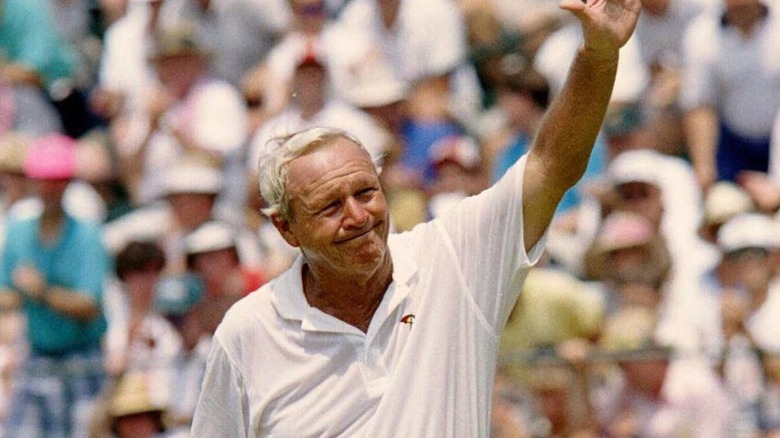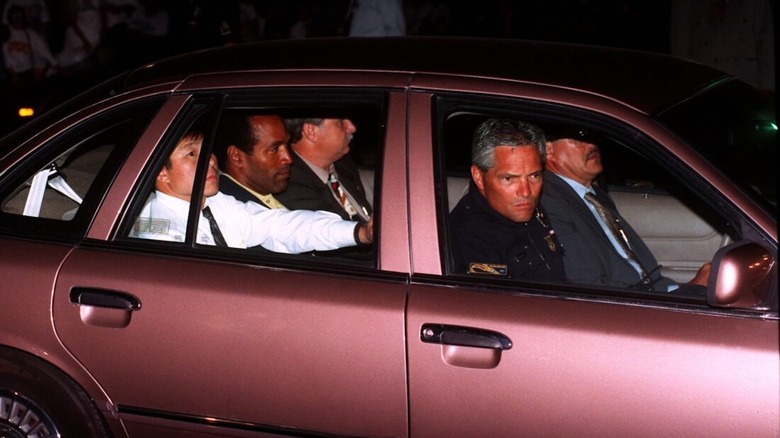This Is The Perfect Time To Watch One Of The Best Documentaries Ever Made
Friday, June 17, 1994 was a monumental day for professional sports in America. For the most part, fans and media knew this when they woke up. The highlights:
- Arnold Palmer — the most beloved golfer on the planet; a charismatic force of nature who commanded "Arnie's Army" and popularized the sport amongst working class people — was, barring a furious comeback from a 64-year-old man, set to close out his final round at the U.S. Open in Oakmont, Pennsylvania.
- In Chicago, the 1994 FIFA World Cup commencement ceremony was taking place, and was doubly significant for marking the first time the prestigious soccer tournament would be held in the United States.
- 500 miles southwest of the Windy City, baseball fans were keeping an eye on the Seattle Mariners tilt with the Kansas City Royals, wherein phenom Ken Griffey Jr. could potentially tie Babe Ruth's MLB record for most home runs before June 30 (of note because this would put him ahead of pace to break the league's all-time single-season home run record held by Roger Maris).
- Meanwhile, Manhattan had a high-profile double header on tap with the Stanley Cup Champion New York Rangers' ticker tape parade in the morning, and, later that evening, Game 5 of the tied-up NBA Finals between the New York Knicks and the Houston Rockets.
What no one could have predicted is that, by sundown, the only event that mattered would involve football legend, movie star, and NBC football reporter O.J. Simpson fleeing a fleet of Los Angeles Police Department cruisers after being charged with the murder of his wife Nicole Brown Simpson and her friend Ron Goldman.
If you were sentient and had access to a television, you'll never forget it. If you weren't there, you can experience the disorientation this evening on ESPN2 via Brett Morgen's 2010 documentary "June 17th, 1994." Regardless of where you were that day, consider this a must-watch because it's one of the greatest documentaries ever made.
A briskly paced, fomula-flouting masterpiece
Documentaries have never been more popular than they are now (streaming services like Netflix are awash in them), but with frustratingly few exceptions, they've also never been more rigidly formulaic. If you're tired of news/home video footage broken up by talking head interviews, "June 17th, 1994" is the 53-minute jolt you've been looking for. It's a media collage composed solely of pre-existing visual materials. The story of the day is told chronologically, bopping back and forth early on between the U.S. Open, the World Cup commencement (hosted by President Bill Clinton and Oprah Winfrey) and the Rangers parade while occasionally cutting to that developing stunner in L.A.
We've been conditioned to process a flurry of information like this since the advent of social media, but in 1994 television and radio were the only means of communication capable of breaking news as it happened. It just so happened that, on this day, a lot of people were glued to their television sets for one or more of these events; ergo, word swiftly got out via phone or good ol' word of mouth that O.J. Simpson had gone from person of interest to prime suspect in the murder of Brown and Goldman.
And this was unthinkable because Simpson was the most likable, least controversial athlete of his era (as made explicit in the 467-minute, Oscar-winning documentary "O.J.: Made in America"). The vast majority of people who'd watched him play football, bolt through airports as a Hertz pitchman or take ungodly physical abuse as Detective Nordberg in "The Naked Gun" movies simply couldn't process him brutally carving up a couple of people with a knife.
And absolutely no one could've predicted he'd make a surreal, low-speed run for freedom from the LAPD upon being charged with homicide.
A prescient account of the looming news apocalypse
Morgen's "June 17th, 1994" plays out from the perspective of a sports media junkie. He essentially skips from channel to channel like a seasoned couch potato, interspersing snippets of the ongoing games and ceremonies with bits of archival footage from Palmer and Simpson's glory days. The latter elements hit like an addled collective memory, sharply juxtaposing Palmer's bittersweet farewell with Simpson's sudden fall from grace. Morgen also drives home that, when forced to choose between a pivotal sporting event and the spectacle of a celebrity threatening to blow his head off from the back of a Ford Bronco on the 405 freeway ... well, we've actually no choice in the matter. Though the Knicks and Rockets entered the fourth quarter knotted at 61, NBC occasionally cut from game play to check in on Simpson's flight from justice (and potential suicide).
Morgen makes no judgments, but you can't watch "June 17th, 1994" and not feel a little queasy as you watch the world go mad over the latest "crime of the century" — one that, like many entries in this unsettling genre, personally touched just a small group of people. What was it to us?
In under an hour, Morgen brilliantly presages the proliferation of all-consuming distractions like the easily manipulated 24-hour-news cycle of cable news, the broad informational expanse of the internet and the cheapening/warping of information on Twitter, Facebook, TikTok and beyond. But while the country had lost its mind over media circuses before, those fevers always broke. I don't think we ever recovered from the O.J. saga.
Morgen's film ends with crowds mulling about Simpson's Brentwood estate as dusk descends on the ritzy neighborhood. When Simpson is finally taken from his house by the police, the (natch) Talking Heads' "Heaven" kicks up on the soundtrack. "Heaven," sings David Byrne, "is a place where nothing ever happens." If so, June 17, 1994 is the day we permanently took up residence in hell.


